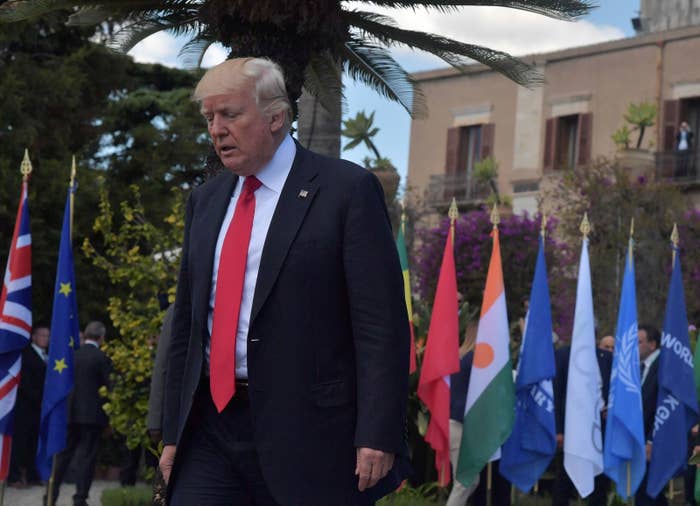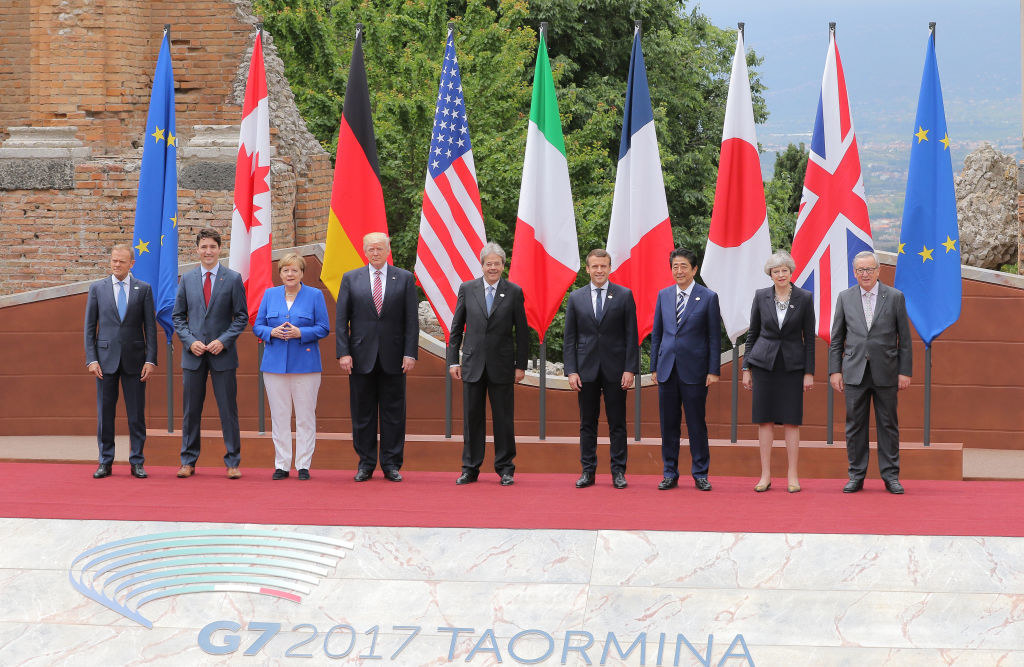
President Donald Trump's skepticism of climate change has officially made him a global outlier, as other world nations formally signaled their firm commitment to the Paris Agreement while the US continues to debate a position.
Leaders of the world’s leading economies meeting in Italy for the annual Group of Seven (G7) summit will leave the Sicilian town of Taormina divided on the issue of climate change.
"The United States of America is in the process of reviewing its policies on climate change and on the Paris Agreement and thus is not in a position to join the consensus on these topics," reads a statement the seven countries signed.
"Understanding this process,theHeads of State and of Government of Canada, France, Germany, Italy, Japan, and the United Kingdom and the Presidents of the European Council and of the European Commission reaffirm their strong commitment to swiftly implement the Paris Agreement."
German chancellor Angela Merkel described the climate talks as “very unsatisfactory”. Leaving the G7 summit she said there was no indication that the US will stay in the Paris agreement, adding that the agreement was so important that there shouldn’t be compromises.
French President Macron said Trump listened to arguments that it was essential for international equilibrium and US reputation that it remains committed to Paris accords, according to the Guardian.
Meanwhile, President Trump tweeted Saturday that he will make a final decision on the future of the US involvement in the Paris Accord next week.

But elsewhere, the US has compromised on a number of the positions the Trump administration held before the Summit.
On trade, the statement reiterated the leaders’ commitment to keeping markets open to fighting protectionism. Crucially, the document “[recognizes] the importance of the rules-based international trading system”, and will reference the WTO.
Going into summit the US was rejecting references to “fighting protectionism in all its forms”, and to the “multilateral trading system” centred on the WTO – in effect the rules-based global trade order – pushing instead for the recognition of a plurality of trade systems. The impasse was unlocked in the early hours of Saturday, sources said.
One diplomatic source BuzzFeed News spoke to on Friday described Merkel as the “star” of a discussion the leaders had about trade, putting on a very strong defense of the free trade position (which was also backed by the leaders of Canada, France, Italy, Japan, and the UK), and in making the case for open markets.
Still, to the certain disappointment of European diplomats, the document makes no reference to the word “multilateral”.
In a nod to Trump’s concerns, the document also references mutually beneficial trade and investment, and commits leaders to standing firm against all unfair practices, as well as acknowledging that trade has not always worked to the benefit of everyone.
The document also confirms that the US has dropped opposition to defining gender equality as a human right as BuzzFeed News reported earlier this week. The final version of the document says: “Gender equality is fundamental for the fulfillment of human rights and a top priority for us, as women and girls are powerful agents for change”.
The six-page long document also state that the leaders “share the same interest in strengthening a rules-based international order that promotes peace among nations, safeguards sovereignty, territorial integrity and political independence of all states and ensures the protection of human rights”.

Talks leading up to the summit had been fraught with frustration. US negotiators insisted on checking even the smallest of details with the White House, as well as on issues that had been settled during working groups or at a ministerial level by members of Trump’s cabinet, a number of diplomatic sources said. The feeling was that a lot of time was wasted on having to renegotiate long-held principles that underpin international relations rather than on future plans.
One topic that had proven contentious ahead of the weekend's meetings was immigration. Hosts Italy were hoping to make migration and refugees central to the summit but their plans were torpedoed by the US.
Still, the final document is seen as a compromise, and a small diplomatic win for the Italian government given the starting positions. On the one hand, the leaders’ statement includes references to securityand economic arguments and interests put forward by the US and the UK that reaffirm countries’ sovereign right to controlling their borders and limiting migration levels.
But at the same time it will also include a commitment to working in partnership to tackle the causes of immigration flows as well as to the human rights of all migrants and refugees. The seven governments are also set to put their weight behind an approach that distinguishes between emergencies and longer-term trends, and includes both refugees and economic migrants.
The leaders’ statement says: “We also acknowledge that states share a responsibility in managing the flows; in protecting refugees and migrants, and safeguarding the most vulnerable of them, such as women at risk, adolescents, children and unaccompanied minors; and in enforcing border control, establishing returns schemes and enhancing law enforcement cooperation.”
On Russia, and the crisis in the Ukraine, the seven leaders reaffirmed the existing consensus that a solution is only possible with the the full implementation of the Minsk Agreements.
The leaders also reiterated their condemnation of “the illegal annexation of the Crimean peninsula”, and said that “sanctions [on Russia] can be rolled back when Russia meets its commitments”. The seven also warned that they stand ready to take ”further restrictive measures” if needed. Adding, however, that “despite our differences with Russia, we are willing to engage with Russia to address regional crises and common challenges when it is in our interest”.
The final statement cites the war in Syria, the crisis in Libya, and the fight against ISIS as key issues. The statement highlights the use of chemical weapons in Syria and will provide a “strong condemnation of the use of chemical weapons anywhere, at any time, by anyone, under any circumstances”. It also calls on those with influence over the Syrian regime, in particular Russia and Iran, to do their utmost to use that influence to stop the tragedy that continues to unfold in Syria.
North Korea is described as a “top priority” in the international agenda because the country “increasingly poses new levels of threat of a grave nature to international peace and stability and the non-proliferation regime through its repeated and ongoing breaches of international law”.
The leaders also state that “Africa’s security, stability and sustainable development are high priorities”, and pledge to work together to tackle cyber attacks.
In addition to their statement, the leaders also signed up to a roadmap for a gender responsive economic environment, which had been promoted by the Italian government.
On Friday the G7 leaders signed a “Statement on the Fight Against Terrorism and Violent Extremism” calling on social networks to crack down on terroristic and extremist content.
